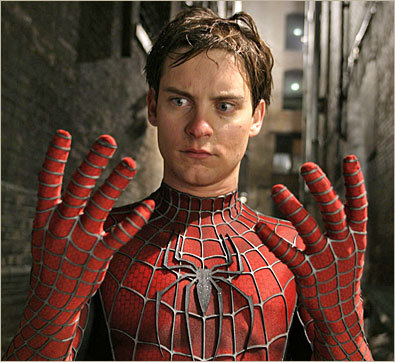Whoa! Bet you didn’t see that
coming, relating a Stan Lee comic book creation with a major philosophical
movement? What am I thinking? Well actually, I’m thinking of one particular sentence
from every version ever of the origin story of Spider Man.

“With great power, comes great responsibility.”
-Ben Parker
That quote repeated in my mind over
and over while I was reading Jean-Paul Sartre’s defense of existentialism, Existentialism is a Humanism. I must say
that out of all the various philosophies we have studied thus far in Search,
existentialism appeals to me more than any of the others, mostly because of
that idea. On the negative side, I am responsible. I cannot claim ignorance as
an excuse; simply the knowledge that there are problems about which I know
nothing removes that claim. Once I recognize that I don’t know everything (and
yes that was a difficult realization for me), I immediately claim responsibility
through my decision to not know everything. This responsibility extends even
more to problems about which I have a definite knowledge. For example, I know
without a doubt that right now, somewhere, a child is dying of a preventable
cause. Even if that child is in India somewhere, I know that he or she is
starving for instance, and am literally doing nothing about it. Therefore, I am
responsible (I’m actually eating as I type this, so if anything I’m adding to
the problem). However, the fact that I am responsible also implies that I am
capable of affecting change. If there was absolutely no way that I could possibly
have an impact on the situation, then there would be no responsibility.
Therefore, on the other side of that coin, I, along with every other individual
have the power to affect real change in the human condition. However, that
power, much like Spider Man’s super powers, can only be rightfully accepted if
I also accept the burden of responsibility that accompanies it.

It's ok to freak out, Toby. Really, it is.
I don’t think that is a bad thing
at all, though. Let’s look at a real example of responsibility. Let’s say you’re
at your job and your boss walks up to you and says, “Hey you’re In charge of
this project that will essentially make or break this company.” At first, it’s
definitely overwhelming to know that so much is depending on your actions. But,
once that initial knee-jerk reaction passes, there’s a since of pride in
knowing that you have the power to drastically affect your company. On a
broader scale, while we as humans have no set “project” per say (since
existence precedes essence), we do have the power to set projects for
ourselves. We are our own bosses, deciding which projects to take on with the
knowledge that by taking on certain projects, we assume responsibility for those
that we don’t tackle. However, we also know that in taking on a project, we are
exercising our power to determine our own identity, and, by doing so, affect a
change, for better or worse, in the entire human condition.
Is this view of existentialism too
idealistic? Is lack of a moral absolute too great a risk to take with humanity?
Is Spider Man the superhero equivalent of existentialism?

Obviously.

I have always found the idea of a universal moral code a bit strange or unnatural. In application morality seems too subjective to be controlled by a code that is not wholly upheld by every rational being. On the other hand, existentialism forces the responsibility of action and inaction into the hands of each individual. This self-empowering mindset of existentialism is not idealistic. It is not pessimistic. It is not a risk. Rather, I would say that it is pragmatic.
ReplyDeleteWay to quote Spider Man. Awesome.
ReplyDeleteI am the kind of person who works well under pressure. To know that I have a great responsibility to myself and/or to others often motivates me to work harder and to do the best possible job I can at my tasks. I guess some of that - okay, maybe a lot of that - is motivated by my fear of failure. I am afraid of becoming anything less than my ideal of of my future self or of letting others down when they are counting on me to "save the day". For me great responsibility is a motivator, but I realize that others crack more easily under pressure or turn more easily to procrastination than I do. I can't describe my work ethic as being anything short of neurotic sometimes. I enjoy feeling productive, like I am being appropriately responsible. As Sartre states, we are responsible for others and things beyond our immediate realm, but when I zero in on what is immediately most significant to me I find that I enjoy taking on extra responsibilities to be helpful.
I love me some Spider Man, that's for sure. I have a hard time believing that you are responsible for everything bad that happens to anyone in the world at any time. I understand what you mean by saying that we are all responsible for what happens to one another but no single person can be held acceptable for everyone else. Not even Spider Man. I would say that your view may be a little too optimistic and idealistic but it is certainly a good thought. I personally believe that if you can do as much good as possible for the people around you or the people you care about then you have fulfilled your responsibility.
ReplyDelete